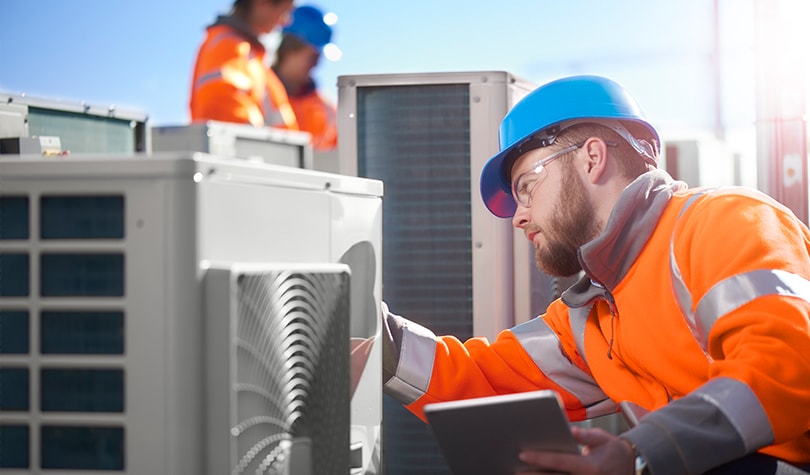Your heating, ventilation, and air conditioning (HVAC) system ensures that the air inside your home is comfortable and safe to breathe. In residential and commercial environments, heating, ventilation, and air conditioning (HVAC) systems are essential for controlling the temperature, delivering clean air, and preserving the appropriate humidity levels. They are intricate systems comprising various components, including thermostats, filters, ducting, furnaces, and air conditioners. It is vital to have a working knowledge of the performance of these systems to recognize the significance of obtaining fast emergency HVAC repair. You can get emergency treatment from the renowned company Superior Air Management.
Understanding HVAC Systems to Perform Emergency HVAC Repair
The acronym “HVAC” refers to a system that regulates the temperature, humidity, and air quality inside a building. In addition, it is vital in keeping homes, businesses, and factories at comfortable temperatures, humidity levels, and air quality. In addition, HVAC systems aim to make a building more pleasant and healthier for its inhabitants.
Multiple parts of a heating, ventilation, and air conditioning system collaborate to keep the indoor environment comfortable and contaminant-free. In case of their malfunction, you will also need emergency HVAC repairs. Among these parts and pieces are:
- Furnaces
- Air conditioners
- Boilers
- Cooling devices
- Appliances that use evaporation to cool the air
- Mini-split ductless HVAC systems
- HVAC Systems
- Pipes for circulating air
- Ventilation fans
- Controls and thermostats
Risks Associated with Ignoring HVAC Problems
The health and safety of you and your property could be at risk if you ignore HVAC problems. The risks of putting off HVAC repairs are as follows:
- Implications for Health
Poor indoor air quality can be caused, in part, by HVAC systems that need to be addressed. Ductwork and air filters can become a breeding ground for dust, allergens, and mould spores, triggering or exacerbating allergy attacks, asthma attacks, and other respiratory diseases. Carbon monoxide is a lethal gas that can be emitted if there are leaks or blockages in the system, posing a serious threat to inhabitants.
- Rising fuel prices
If problems with the heating, ventilation, and air conditioning system aren’t fixed, running it to maintain a comfortable temperature will require more resources than necessary. Utility costs will increase if the system has to work harder because of duct leaks, worn parts, or clogged filters. Ignoring these problems is not only financial waste but also environmental harm.
- Shorter Service Life Expectancy
Premature breakdown is common in HVAC systems where problems still need to be addressed or maintenance needs to be addressed. Overuse can shorten the lifespan of parts, necessitating replacement or expensive repairs. Your HVAC system will last longer if you maintain it and fix any problems as soon as they arise.
- Danger of a Fire
Overheating components or faulty electrical connections in an HVAC system can lead to catastrophic fires. Your property’s and its inhabitants’ safety is in danger if you fail to take action when you see symptoms of trouble, such as unusual odors, burnt odors, or electrical failures. Taking care of these problems quickly is critical for fire safety and general building security.
Advantages of Immediate Emergency HVAC Repair
- Increases Efficiency of the System
Maintenance technicians should be available for emergency HVAC repairs as soon as possible. When an HVAC system has an unexpected problem, like a broken compressor or a refrigerant leak, it can quickly lose efficiency. Therefore, if you fix these issues immediately, you can get the system running smoothly again and keep it that way.
- Limits Further Injury
Preventing additional damage is a major benefit of quickly getting emergency HVAC repairs done. Furthermore, delaying an HVAC emergency can cause further issues that may be more difficult and expensive to repair. You can prevent the problem from worsening and limit the extent of the system’s harm if you act quickly.
- Promotes Resource Conservation
Reduced energy efficiency is a common effect of HVAC emergencies. In addition to not providing the expected heating or cooling output, a malfunctioning system uses additional energy. Restoring the system’s energy efficiency and avoiding astronomical utility bills is possible once the urgent problem has been fixed. In addition to enhancing energy efficiency, attending to the problem quickly also aids in preventing future damage to the HVAC unit. HVAC emergencies require prompt attention because of the importance of minimizing energy waste and maintaining peak performance.
Act Now by Giving Top Priority to Emergency HVAC Repair
It would help if you had a solution fast when your heating, ventilation, and air conditioning (HVAC) system fails. When you know what to do in an emergency and how to deal with common HVAC issues, you can keep business running smoothly with minimal downtime.
Also, schedule regular maintenance and fix any problems immediately so you may avoid any unexpected catastrophes. Consider the company’s history, reaction time, and testimonials from satisfied clients before deciding on an emergency HVAC repair service. Keeping to these rules allows you to easily handle HVAC emergencies and keep your home at a reasonable temperature year-round.
FAQ’s
Q1. Why do HVAC systems fail?
A1. Low refrigerant levels or leakage. Problematic wires and plugs. Condensate drain obstruction. Both the condenser and evaporator coils are dirty.
Q2. How do you define HVAC PM?
A2. Preventative maintenance aims to ensure that your heating, ventilation, and air conditioning system runs smoothly and reliably throughout the heating and cooling seasons.
Q3. In what ways might an HVAC system be damaged?
A3. Any method that reduces its efficiency will likely damage your air conditioner. If vents are covered or closed, airflow is disrupted and efficiency drops. Dirt, dust, and other particles buildup can also obstruct ventilation.



